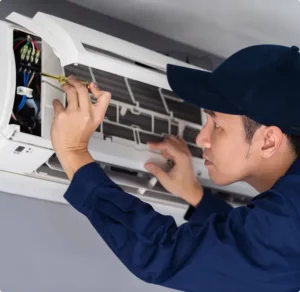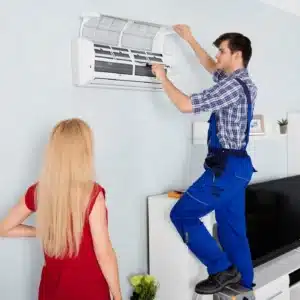Signs Your AC Needs Repair
In Florida’s sweltering heat, a reliable air conditioning system is...
Regular maintenance is the key to ensuring your air conditioning system operates efficiently, providing optimal comfort during the sweltering months. In this article, we’ll delve into factual tips for air conditioning system maintenance, offering practical insights to help homeowners keep their systems in top condition and avoid potential issues.
One of the simplest yet most crucial maintenance tasks is replacing air filters regularly. Dirty filters restrict airflow, making your system work harder and reducing its efficiency. Check your filters monthly and replace them as needed, especially during peak usage periods.
Over time, the condenser coils on your outdoor unit can accumulate dirt and debris. Clean the coils annually to maintain proper heat exchange. Use a soft brush or vacuum cleaner to remove debris gently. Keeping the coils clean ensures efficient heat transfer and enhances overall system performance.
The evaporator coils in the indoor unit can also collect dirt, affecting their ability to absorb heat. Inspect and clean these coils annually. Use a fin comb to straighten any bent coil fins and ensure unrestricted airflow.
Over time, condensate drains can become clogged with algae or mold, leading to water damage and reduced humidity control. Regularly inspect and clear condensate drains to prevent blockages. Use a mixture of bleach and water to flush out any accumulated debris.
Ensure your thermostat is accurately reflecting the temperature in your home. If you notice discrepancies, consider recalibrating or upgrading your thermostat. An accurate thermostat promotes energy efficiency and precise temperature control.
Regularly inspect and tighten electrical connections to ensure safe and efficient operation. Loose connections can lead to system malfunctions, increased energy consumption, and even potential electrical hazards. Turn off power before inspecting and tightening connections.
Proper refrigerant levels are crucial for efficient cooling. If you notice reduced cooling performance or ice buildup on the coils, it may indicate a refrigerant issue. Consult with a professional HVAC technician to check and adjust refrigerant levels as needed.
Moving parts, such as fan motors and bearings, can experience wear over time. Regularly inspect these components and lubricate them as necessary. Well-lubricated parts reduce friction, extend the lifespan of your system, and contribute to smooth operation.
The outdoor condenser unit is exposed to the elements, making it susceptible to debris and weather damage. Trim vegetation around the unit to ensure proper airflow and protect it from falling leaves or branches. Consider covering the unit during the offseason to prevent debris buildup.
While there are tasks you can perform yourself, scheduling professional maintenance is essential. An annual inspection by a qualified HVAC technician allows for a comprehensive evaluation of your system, addressing potential issues before they become major problems.
Effective air conditioning maintenance involves a combination of regular homeowner tasks and professional inspections. By following these factual guidelines, you can ensure that your air conditioning system operates efficiently, providing reliable cooling and extending its lifespan. A well-maintained system not only enhances comfort but also contributes to energy savings and minimizes the risk of unexpected breakdowns.

In Florida’s sweltering heat, a reliable air conditioning system is...

In Florida’s hot and humid climate, HVAC systems are essential...

Florida’s warm climate brings many advantages, but it also means...

When it comes to keeping your home comfortable in Florida’s...

In Florida’s hot and humid climate, a reliable air conditioning...

If your air conditioner has been chugging along since the...